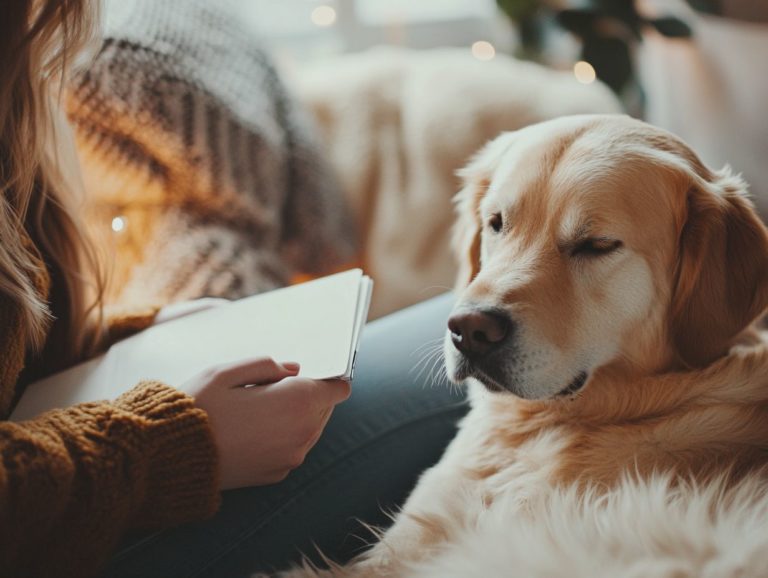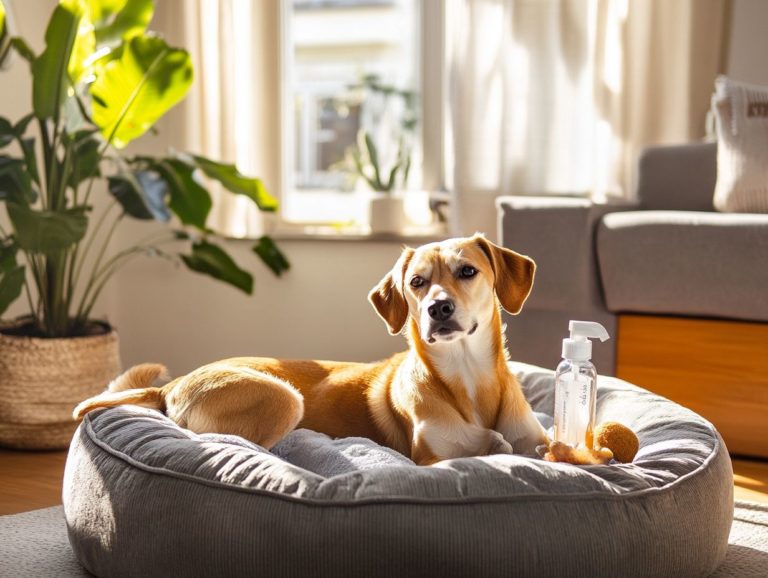What Natural Remedies Can Help with Pet Anxiety?
Pet anxiety is a widespread concern that impacts many beloved companions, showing up in various forms, from destructive behaviors to excessive barking. Grasping the causes and symptoms is your first step toward offering relief.
Get ready to explore effective natural remedies that can transform your pet s anxiety! This article delves into natural remedies, such as herbal supplements and aromatherapy, along with effective behavioral techniques to cultivate a calming environment for your pet. It also highlights when it s time to seek professional help and provides practical tips for preventing and managing anxiety.
Discover how you can guide your pet toward a more relaxed and joyful life!
Contents
- Key Takeaways:
- Understanding Pet Anxiety
- Natural Remedies for Pet Anxiety
- Behavioral Techniques for Managing Pet Anxiety
- When to Seek Professional Help
- Preventing and Managing Pet Anxiety
- Frequently Asked Questions
- What Natural Remedies Can Help with Pet Anxiety?
- Can I Use Human Medications to Treat My Pet’s Anxiety?
- How Do I Know if My Pet Has Anxiety?
- Are Natural Remedies Safe for All Pets?
- Are There Any Lifestyle Changes That Can Help with Pet Anxiety?
- Can I Combine Different Natural Remedies to Treat My Pet’s Anxiety?
Key Takeaways:
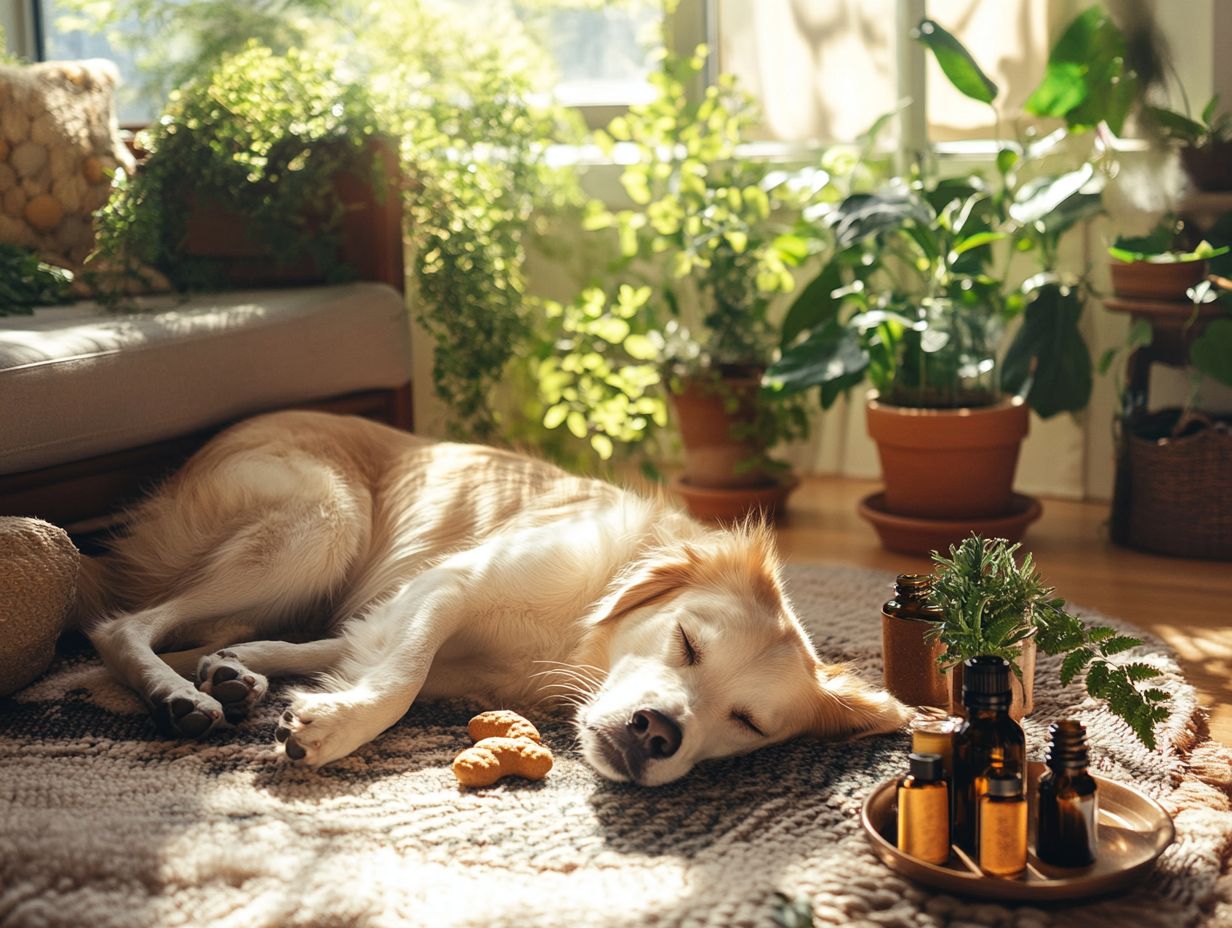
- Herbal supplements, such as chamomile and valerian, can help reduce pet anxiety.
- Aromatherapy, with calming scents like lavender and cedarwood, can also be beneficial for anxious pets.
- Acupuncture and massage therapy are natural treatments to help manage pet anxiety.
Understanding Pet Anxiety
Understanding pet anxiety is essential for you as a dedicated pet parent seeking to provide the highest level of care for your furry companion. Anxiety in dogs can present itself in various ways think separation anxiety when they re left alone, excessive barking, or even behaviors like pacing and hiding.
A thorough grasp of these signs is vital for effective pet care and mental health management. By recognizing these anxiety indicators, you can implement suitable interventions to ensure a calmer, happier dog.
This knowledge lays the groundwork for exploring natural remedies and behavioral techniques that can effectively manage anxiety, enhancing your pet s overall well-being.
Causes and Symptoms
The causes of anxiety in dogs can be quite varied, ranging from environmental changes to genetic predispositions. It’s crucial for you as a pet parent to identify things that cause anxiety to manage your furry friend effectively. Common symptoms like excessive barking, destructive behavior, and withdrawal could signal separation anxiety or other underlying issues.
Environmental factors can amplify this anxiety. Moving to a new home, loud noises from thunderstorms or fireworks, or even alterations in daily routines can have a significant impact. Socialization issues may come into play if your dog hasn t been exposed to various people, animals, or situations during key developmental stages.
Past traumas like neglect or abusive experiences can leave dogs feeling overly cautious or fearful. For instance, a dog that has been abandoned might panic when left alone, while one that suffered an injury from another dog may show aggression in unfamiliar social situations.
By understanding these behaviors and recognizing early signs of anxiety, such as pacing or changes in appetite, you can effectively address the problem and enhance your dog’s quality of life.
Natural Remedies for Pet Anxiety
Natural remedies for pet anxiety provide holistic solutions that beautifully complement behavioral techniques in managing your dog’s anxiety. For more insights, consider exploring resources available for learning about pet anxiety. These remedies encompass calming supplements like CBD oil, herbal treatments such as valerian root and chamomile, and therapies aimed at creating a soothing environment for your dog.
By integrating these natural solutions into your pet care routine, you can significantly enhance your dog’s emotional well-being and diminish anxiety-triggered behaviors.
Herbal Supplements
Herbal supplements are gaining popularity among pet parents looking for natural ways to help with dog anxiety. Options like valerian root and Rescue Remedy can easily fit into your pet care routine, promoting relaxation and easing anxiety symptoms.
Valerian root is a mild sedative that promotes restful sleep and reduces tension. On the other hand, Rescue Remedy is a blend of flower essences designed to calm pets during stressful moments.
Proper dosing is key for effectiveness. Too much can cause side effects like lethargy or digestive discomfort. Research shows that dogs treated with these supplements often show significant improvement in anxiety-related behaviors. Many pet owners report noticeable changes in their pets’ demeanor.
One happy pet parent shared, “After adding valerian root to my dog’s routine, his separation anxiety has greatly decreased, making our time apart much easier.” Such testimonials highlight the benefits of considering herbal options for pet anxiety relief.
Aromatherapy
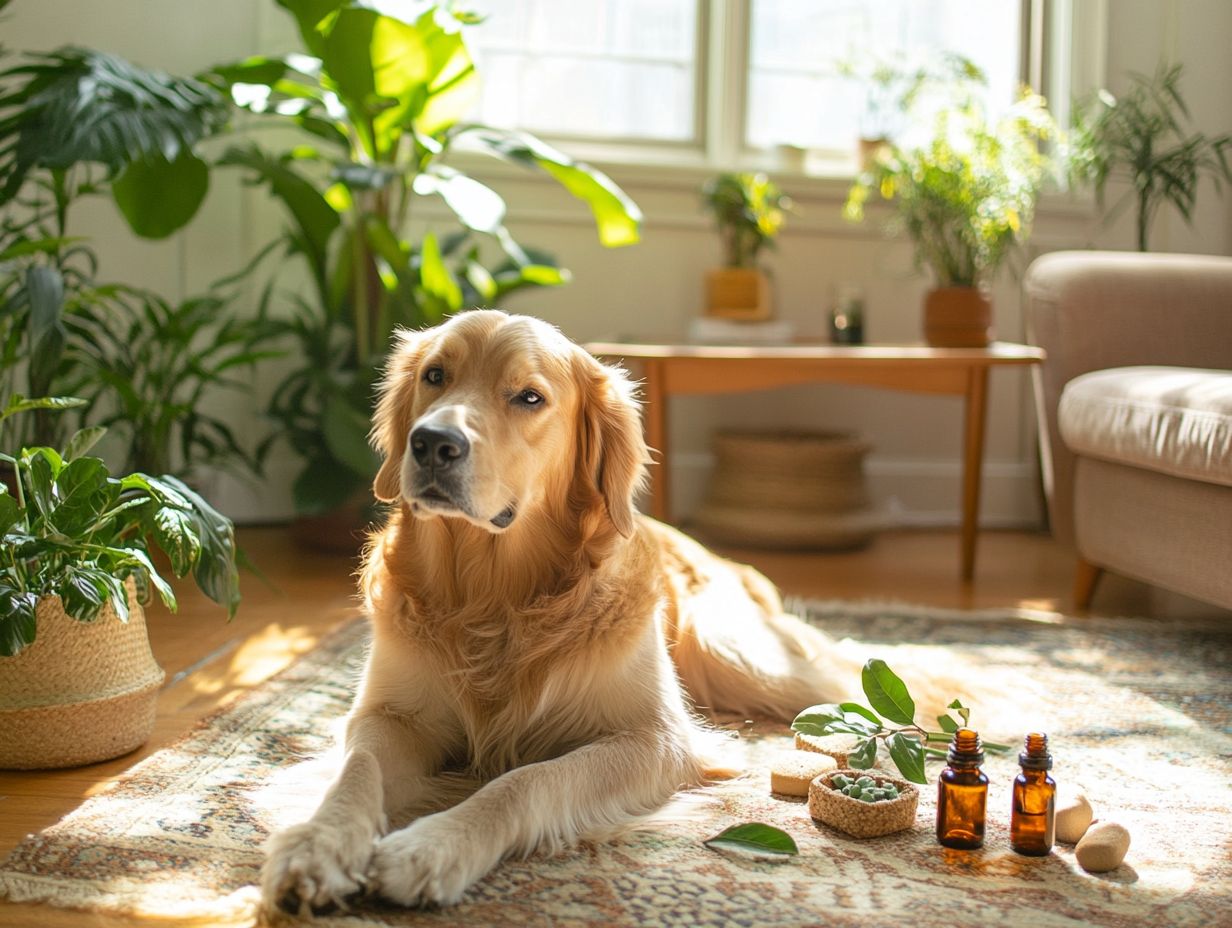
Aromatherapy is an exciting way to help your pet feel calm! It uses soothing scents like lavender and chamomile to create a peaceful environment for your dog. By adding essential oils to their space, you can foster relaxation and reduce anxiety-driven behaviors.
Essential oils offer numerous benefits. Whether you’re diffusing them at home or using them topically in diluted forms, it’s essential to choose pet-safe options. Be sure to monitor your dog’s reactions to new scents, as their sensitivities can vary.
For instance, introducing a diffuser can transform your home into a calming haven. Blending lavender oil with soft music can enhance the relaxation experience. Combining aromatherapy with soothing tunes creates a calming atmosphere that reduces stress, allowing your furry friend to feel more comfortable.
Acupuncture and Massage Therapy
Acupuncture and massage therapy are new ways to help dogs feel better. These techniques can significantly reduce anxiety, allowing your pet to relax and improving their well-being. By using these methods, you not only lower stress but also encourage the release of endorphins, which helps your dog cope with anxiety triggers.
More pet parents are embracing these holistic methods to support their pets during tough times. Acupuncture uses small needles at specific points on your dog s body to restore balance and relieve tension. Massage therapy improves circulation and fosters comfort.
Both research and personal stories show that dogs receiving these therapies often experience a noticeable decrease in anxious behaviors, like excessive barking and destructive chewing. If you’re interested, look for a certified canine therapist for guidance. You might also learn simple massage techniques to help your pet feel more at ease.
Behavioral Techniques for Managing Pet Anxiety
Implementing behavioral techniques is essential for managing your pet’s anxiety effectively. These strategies create a predictable structure and provide the mental stimulation dogs need.
Using methods like behavior modification through training and encouraging socialization can significantly lower anxiety triggers and promote confident, calm behaviors in your dog.
Try these methods today to help your furry friend feel more at ease!
Training and Socialization
Training and socialization are essential for alleviating anxiety and establishing a structured routine for your dog. These elements ultimately enhance their coping skills. By engaging in regular training sessions, you modify anxiety-driven behaviors and strengthen the bond between you and your furry companion.
Incorporating various training methods, such as getting your dog used to things that scare them and teaching your dog to feel safe in scary situations, allows you to gradually expose your dog to anxiety-inducing situations in a controlled manner. This approach helps them understand that these environments are safe, reducing their overall stress levels.
Socialization is equally crucial, providing your dog with opportunities to interact with a variety of people, pets, and stimuli. This can significantly diminish their fear responses. By consistently employing positive reinforcement techniques rewarding calm behavior with treats or praise you reinforce desired actions and cultivate a sense of security and trust in their surroundings.
Creating a Calming Environment
Creating a calming environment is essential for managing your pet s anxiety. It provides a soothing space where your dog can feel secure and relaxed. This can be achieved by utilizing stress relief techniques like white noise, calming music, and maintaining a predictable structure.
Imagine how soothing it is for your dog to have a cozy retreat when they’re feeling overwhelmed! Begin by designating a quiet area in your home a cozy corner with soft bedding and your dog’s favorite toys where they can retreat when feeling stressed.
Introducing calming music or white noise during stressful situations, such as thunderstorms or fireworks, can effectively mask unsettling sounds and create a serene atmosphere.
Establishing consistent routines like regular feeding times, walks, and play sessions can help your dog anticipate daily activities, reducing anxiety. By making these adjustments, you cultivate a soothing environment that alleviates anxiety and enhances your dog s overall behavior, promoting a happier life for both of you.
When to Seek Professional Help
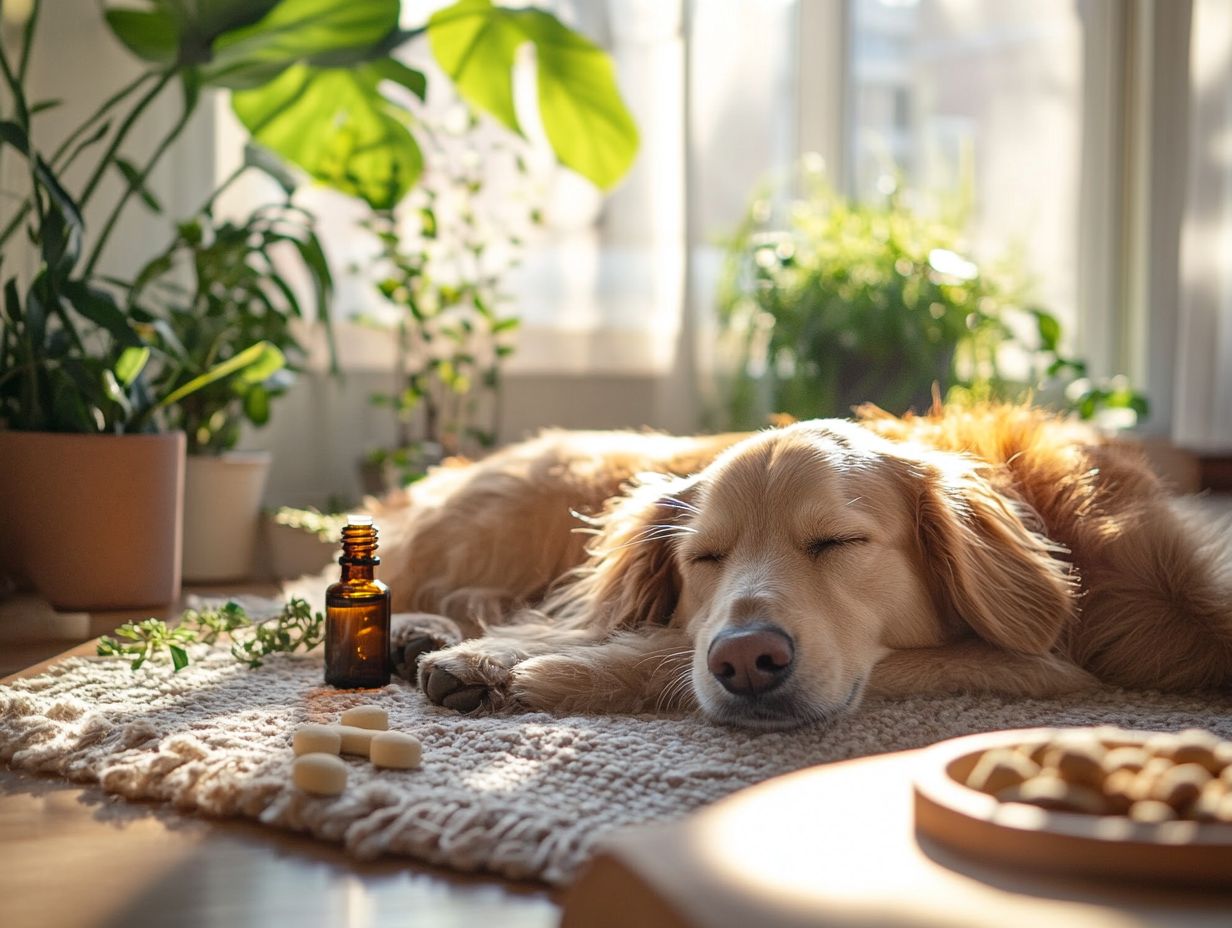
Knowing when to seek professional help is crucial for ensuring your dog s emotional support and overall well-being. This is particularly important if dog anxiety starts to manifest as behavioral issues.
If you notice persistent signs of anxiety, fear, or distress in your dog that disrupt daily life, consult a veterinarian or a certified trainer. They can help you explore effective treatments tailored to your dog’s needs.
Signs that Your Pet Needs Additional Support
Recognizing the signs that your pet requires additional support is essential for timely intervention and effective stress management. If you observe extreme fear during storms, furniture destruction, or a reluctance to participate in daily activities, it may indicate that your dog greatly benefits from specialized emotional support.
Pay attention to signs like excessive barking, trembling, or hiding; these are red flags that deserve your consideration. Changes in eating habits, such as a reduced appetite or sudden weight loss, can further signal distress, suggesting that your pet is overwhelmed by anxiety.
By identifying these behaviors early, you can seek help or develop effective coping strategies, ensuring a healthier emotional environment for your furry companion. Ignoring these manifestations can lead to chronic stress levels, resulting in more serious behavioral issues such as aggression or withdrawal, complicating your pet’s overall well-being.
Preventing and Managing Pet Anxiety
To effectively prevent and manage pet anxiety, you need a proactive strategy that intertwines a regular exercise routine with mental stimulation. This keeps your dog engaged and content.
Establishing a consistent schedule significantly reduces anxiety triggers, creating a comforting sense of security for your furry companion.
If you see any signs of distress, act quickly to provide support before it escalates!
Start today to ensure a happier, healthier life for your furry friend!
Tips for Reducing Stress and Anxiety in Pets
Your furry friend deserves a happy life! Using simple strategies to reduce stress and anxiety in pets is essential for their emotional health.
By prioritizing these techniques, you can create a serene environment that fosters comfort and security for your companion.
Establish a daily routine that includes playtime, enrichment activities, and quiet periods. These steps can significantly enhance your dog’s mental wellness.
Regular training sessions instill discipline and provide mental stimulation. These small changes can greatly improve your dog’s mood, leading to a healthier, happier life.
Frequently Asked Questions
What Natural Remedies Can Help with Pet Anxiety?
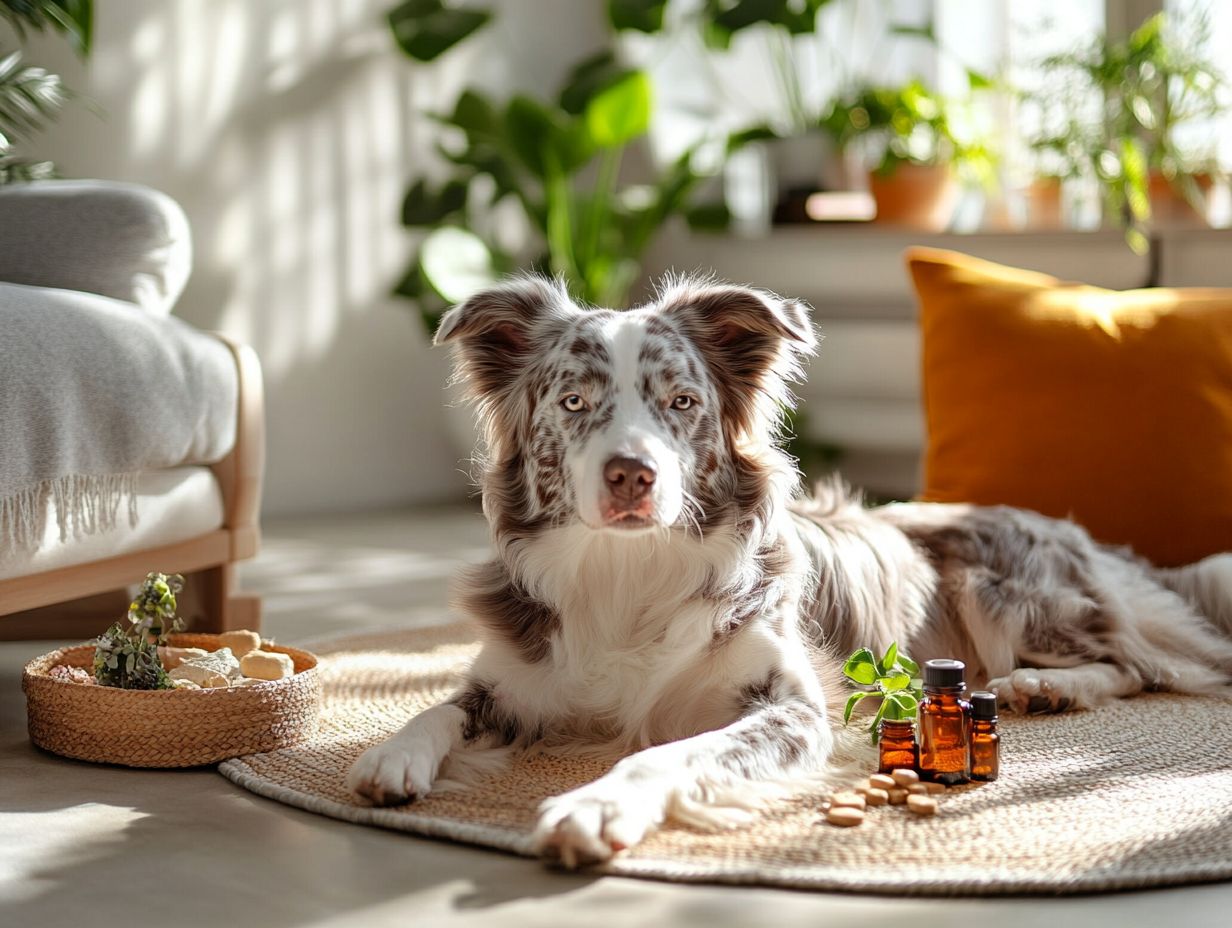
Natural remedies for pet anxiety include herbal treatments like valerian root, chamomile, and lavender. If you’re wondering what to do if your pet is anxious after moving, you can also consider CBD oil, which is derived from hemp plants and helps calm pets.
- Herbal supplements such as valerian, chamomile, and passionflower.
- Essential oils like lavender and bergamot.
- ThunderShirts that provide gentle pressure to calm anxious pets.
- Adaptil collars and diffusers that release calming pheromones.
- Regular exercise and mental stimulation through puzzle toys and interactive play.
Can I Use Human Medications to Treat My Pet’s Anxiety?
No, it is unsafe to give your pet human medications for anxiety. These can be toxic and have different effects on animals. Always consult your veterinarian before giving your pet any medication, including natural remedies.
How Do I Know if My Pet Has Anxiety?
Common signs of pet anxiety include excessive barking, destructive behavior, hiding, and changes in appetite or sleep. If you notice these, consult your veterinarian for a proper diagnosis and treatment plan.
Are Natural Remedies Safe for All Pets?
Natural remedies can be effective, but they aren t always safe for every pet. Speak with your veterinarian before trying new remedies, especially if your pet has health issues or takes other medications.
Are There Any Lifestyle Changes That Can Help with Pet Anxiety?
Yes, small changes to your pet’s routine can reduce anxiety. Create a calm environment, ensure regular exercise, and establish a consistent routine.
Can I Combine Different Natural Remedies to Treat My Pet’s Anxiety?
Consult your veterinarian before combining natural remedies. Some combinations might be safe, but others could interact negatively. Your vet can help create a treatment plan tailored to your pet’s needs.

